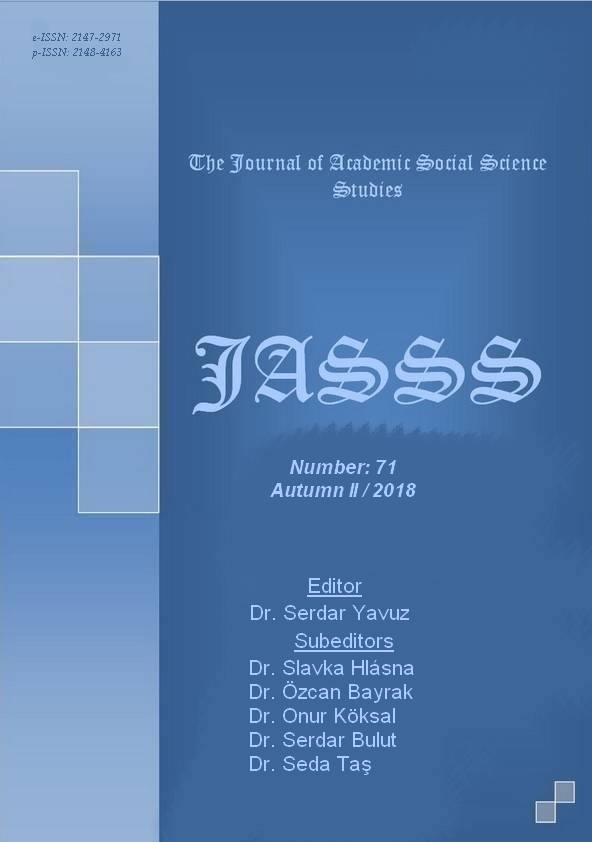SOSYO-EKONOMİK FAKTÖRLERİN ORTAOKUL ÖĞRENCİLERİNİN TÜRKÇE DERSİNE YÖNELİK TUTUMLARI ÜZERİNDEKİ ETKİSİ
Author :
Abstract
Türkçe dersi örgün öğretimin ilk yıllarından itibaren öğrencilerin zihinsel, bilişsel ve duyuşsal gelişimlerinde etkili olan bir derstir. Okuma, dinleme, konuşma ve yazma öğrenme alanlarında uygulanan etkinliklerle öğrencilerin dil ve düşünme becerileri ile sosyal becerilerinin gelişimi sağlanarak hem bilişsel ve zihinsel, hem sosyal yönden donanımlı nesiller olarak hayata başlamaları sağlanmaktadır. Böylelikle hem yaşamda hem akademik sınavlarda başarılı nesiller yetiştirilmesi hedeflenmektedir. Bu nedenle öğrencilerin Türkçe dersine karşı olumlu tutum sergilemesi, derse karşı olumlu yaklaşımlar beslemesi bu becerilerinin de gelişimini doğrudan etkilemektedir. Bu çalışmanın amacı, sosyo-ekonomik ve kültürel faktörlerin ortaokul öğrencilerinin Türkçe dersine yönelik tutumları üzerindeki etkisini ortaya koymaktır. Araştırmada betimsel araştırma yöntemine başvurulmuştur. Veri toplama aracı olarak yazar tarafından oluşturulan bir tutum anketi kullanılmıştır. Bu çalışmada Siirt ilindeki merkez ortaokullarında okuyan öğrencileri temsil edecek şekilde farklı sosyo-ekonomik çevrelerden seçilmiş bir örneklem grubundan hareketle sosyo-ekonomik faktörlerin Türkçe dersine yönelik tutumları üzerindeki etkisi hakkında genel bir yargıya ulaşmak amaçlanmıştır Örneklem olarak seçkisiz örnekleme yöntemiyle farklı sosyo-ekonomik ve kültürel çevrelerde yer alan okullarda bulunan 6710 öğrenci oluşturmuş, ancak bunlardan anketi ilgisiz ve özensiz dolduranlar elendikten sonra kalan 6000 öğrenci asıl örneklemi oluşturmuştur. Elde edilen veriler SPSS 21 paket programı ile incelenmiş olup, anketin güvenirlik alpha katsayısı .89 bulunmuştur. Öğrencilerin Türkçe dersine yönelik tutumları arasında cinsiyet, velinin çalışma durumu, gelir düzeyi, kitap okuma sayısı, ailenin yapısı, anne babanın birlikte olma durumu ve anne babanın okuryazarlık durumu değişkenlerine göre öğrencilerin görüşleri arasında anlamlı bir farklılık olmadığı sonucuna ulaşılmıştır.
Keywords
Abstract
Turkish lesson is a lesson that is effective in the mental, cognitive and emotional development of students since the first years of formal education. Through the activities implemented in the areas of reading, listening, speaking and writing learning, students' language and thinking skills and social skills are provided to be developed, these skills help them to start life cognitively, mentaly and socially equipped generations.Therefore, the positive attitude of the students towards the Turkish lesson and the feeding of positive approaches towards the course directly affect the development of these skills. The aim of this study is to reveal the effect of socio-economic and cultural factors on the attitudes of secondary school students towards Turkish lesson. Descriptive research method was used in the research. In this study, it is aimed to reach a general judgment about the effect of socio-economic factors on Turkish lesson attitudes, based on a sample selected from different socio-economic circles, representing students studying in central secondary schools in Siirt. The sample consisted of 6710 students in different socio-economic and cultural environment schools, however after elimination of students who filled in questionnaire irrelevant, 6000 students had consisted the main sample. The data obtained were analyzed with SPSS 21 package program and the reliability coefficient of the questionnaire was 89. Among the attitudes of the students towards Turkish lesson, it was concluded that there was no significant difference between the views of the students according to the variables of gender, working status of the parent, income level, number of books, family structure, parents' co-existence and parents' literacy status.





